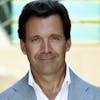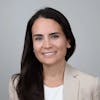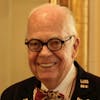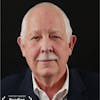Reimagining Hospitality Through Technology - Ed Skapinok, Appellation

Appellation is a new culinary-forward luxury hotel company co-founded by chef Charlie Palmer and Christopher Hunsberger, the former president of Four Seasons Hotels and Resorts. In this episode, we're speaking with Ed Skapinok, the company's chief commercial officer - about how they have designed a modern approach to technology that supports their brand.
Ed is on the board of directors for HSMAI, and he previously led sales, marketing, and revenue at Aqua-Aston Hospitality - an award-winning hotel management company.
In this episode we cover how to think about technology's ideal state, how technology should support the brand promise, creating more human working environments, qustions to ask, enabling personalization - and much more.
Listen to our previous episode with Ed: Culinary-Forward Luxury Hospitality
Join the conversation on today's episode on the Hospitality Daily LinkedIn page.
Hospitality Daily isn't just a podcast! Every morning - Tuesday through Friday - I summarize the stories you need to know as a hospitality professional in a short email. Read today's issue and subscribe here.
Josiah:
Imagine you were building a new brand with some legendary hospitality leaders and had a totally blank slate to think about technology. What would you do? Today we're learning from someone who is an impressive leader in his own right about how he approached this and how it can inspire the way that you think about technology, regardless of where you're working. Appellation is a culinary-forward new luxury hotel company co-founded by a chef, Charlie Palmer, and the former president of Four Seasons, Christopher Hunsberger. We did a deep dive into the story of that brand that I'll link to in the show notes, but today we're speaking again with Ed Skapinok, the company's chief commercial officer, this time about how they've designed a modern approach to technology that supports their brand. Ed is on the board of directors at HSMAI and he previously led sales, marketing, and revenue at Aqua-Aston Hospitality, an award-winning hotel management company based in Hawaii. In this episode, we're going to cover how to think about technology's ideal state, how technology should support the brand promise, creating more human working environments, questions to ask enabling personalization, and much more you were talking about when you were thinking about the tech stack. You want to do something a little bit unusual and you actually wanted to have less tech. I wonder if you could tell me a little bit about that.
Ed:
Yeah, that's a big part of it and probably for the last 15 years or so not to date myself, but I've been saying I hope that one day technology catches up to our ambitions in our business, and I think that day has arrived. There's a lot that we could do now that we just didn't have the capabilities to do, and I'm talking about not just from marketing or guest communications, but also how we interact with our guests, and you're right about having a blank slate here to work with. That's really exciting. There's not a lot of opportunities to do this, but I do think that the approach that we took can work in any organization. It's certainly useful to us that we didn't have legacy systems that we needed to switch, but ultimately, how you design technology to use in your company and the steps that you take to deploy it absolutely the same. It's just maybe there's a different time frame for doing it or it's done in different phases a little differently than we did, but our approach for technology. We didn't talk about systems, we didn't talk about software. We started off with two questions what experience do we want for our guests and what experience do we want for our employees? And then everything flowed from there. We also did some research and found that in the typical luxury hotel, at any given moment, there could be any number of 154 different business functions happening and you can use technology to solve for some of those, all of those, none of those, I mean. You can check people in manually. It's just not very efficient and not a very good idea. So there were just all these you know, 154 different business functions, and through our research, we determined that in a typical hotel like ours, a typical luxury hotel, there are 120 different pieces of technology for those 154 business functions. So there are a lot of single-platform systems that are working to operate a hotel. So when we created our technology ecosystem, we decided, rather than start to identify certain individual pieces and then build around them later, why don't we identify all of the pieces in the ecosystem so that we know that they all fit together, work together very well, and then let's try and do it with as few moving parts as possible? So out of the 120 that you typically find in a typical hotel like ours, we were able to design a technology ecosystem that we call Appalachian Insights. That is a third of that number, and so that is a tremendous benefit because that's fewer systems to have to purchase, fewer systems to have to implement and train people on and when you have turnover have to retrain people on and just the cost of maintaining and managing those systems. It's a tremendous operating advantage that we have that we're not working with two-thirds more of the number of pieces of tech, but I would say that our capabilities are far greater because we're not trying to make systems that aren't designed to talk together and work together. We're not trying to create those bridges between them. We know that everything works together really well and it's entirely cloud-based, so we've got efficiencies there and our tech actually will become less expensive to operate over time versus more expensive, which is what a lot of legacy systems are based on.
Josiah:
I'm excited to see what that's going to empower you to do. I think what you're mentioning has value to anyone listening to this, regardless of where they are. Of just simplifying, there's a couple things you mentioned around. You talked as an industry, tech has sort of caught up with our ambitions more than it has in the past, but you started with the questions that really matter. You know, what is the guest experience? What's the staff experience? What else would you say, would you kind of chalk up to technology being able to provide this in a more simplified manner? Are some of these tech companies adding functionality, or is it connectivity, or what have you seen evolve on the technology landscape that now enables this sort of thinking or operating? I should say?
Ed:
Well, I think the preponderance of cloud-based technology has certainly helped, because it makes your ability to support those systems much easier, especially throughout a portfolio or an enterprise. We are seeing that many of the suppliers that we work with are branching out and either vertically integrating their products or starting to offer a wider range of solutions within their suite. So we actually think that over time we could even reduce that number because more of our key suppliers are going to be able to provide a broader range of solutions to us. So that's exciting and I think that's a benefit that will happen for everybody in the industry. But we're confident in the suppliers that we've chosen. You know that that will absolutely be a benefit for Appalachian.
Josiah:
How do you evaluate and shop for technology, because there are so many companies out there and I'm sure everyone wants to talk to you. It seems challenging. How did you go through that process? You kind of talked about the business strategy, but when it came down to shop and evaluate potential partners, how did you do that?
Ed:
Right? Well, you know we started the process several years ago. It's been a very involved process. We actually hired a CIO he was a consultant so you know he works for us the majority of his time, but we've left him open to take on other projects if he'd like. But he's a key member of our team and we knew from the time that we started talking with him and having conversations about our guest experience and our employee experience not even talking about hardware or any of that that we had the right person. His name is Mark Fancourt. He is a good guy and he was very instrumental in helping us build this ecosystem. So we relied on Mark's experience with luxury hotel operators. That was his background. And then he also had experience in the casino industry, and we liked that, because so much of what we sell in our hotels, or the experience, what we're able to provide, is non-rooms, and so we wanted somebody that really understood that landscape and understood true luxury. And so he had that background, the right fit for us. And so he went through a series of this exploratory series to find the right providers for us, and some of them I know are great providers, but they just weren't necessarily the right providers for us. So I think that everything that we've assembled in our tech ecosystem, it really is for our needs and how we want to deploy it, and I think that's what makes it really unique. And somebody else may come along and interview all the same companies that Mark talked to and come away with a completely different list. The idea is really understanding what your objectives are at first, and for us it was really insightful to think about these business functions and then solve for them in the way that was true to our ambitions of providing the right guest experience, the right employee experience, using technology and making it simple and not having the tech get in the way.
Josiah:
So to that notion of building something unique, I wonder if you could speak a little bit more to how this technology ecosystem that you've created is different.
Ed:
So for us, our brand strategy is personalization, and that's very clearly on the marketing side and how we approach guests or potential guests. It really does inform everything that we do there, but then also on the guest experience side, and so technology at its core is helping us collect and make actionable data that will enhance the experience for our guests.
Josiah:
Yeah, and where do you see the biggest opportunities for that within the whole traveler journey? You've kind of seen all elements of this. Where do you feel people get it wrong or they're focusing on the wrong things?
Ed:
Yeah, that's an interesting question, Not necessarily that they're focusing on the wrong things, but what we're focused on is having a lot of opportunities to collect information that the guests provide us, and there's a lot of shopping behavior, historical activity that you can get from guests, and I don't know that everybody does such a great job of collecting it. But I do think that many more have gotten good at collecting customer information. I think the real trick here in the landscape that we're in today and over the next few years will be how to activate that data. So, for example, for us, something that was really important was to get detailed folio-level data into our CRM. So we don't want to just know that somebody spent $250 on dinner last night. We want to know what entrees they ordered, and what bottle of wine, and have that feed our personalization engine so that, without our marketing team even having to think about it, the images that customer sees when they go to our website change based on what we know about them and their previous behaviors. So if you were to go to our website and somebody else was to go to our website, it might look totally different to the two of you based on what we know about your interactions with us, your preferences, your shopping behavior, and I think that that's really where companies that are able to do that will have a great advantage, because and this was always our ambition and where I was hoping technology could catch up to make sure that we're not just marketing to the market segment level or the distribution channel level, but marketing and revenue managing to the individual traveler level. And that takes a lot of work and that's something that we've invested a lot to make sure that we've got the capabilities to do.
Josiah:
There are a lot of exciting opportunities, I feel, around activating this sort of data and I think on the commercial side, the digital personalization is so big, I think on property to operationalizing this information. You talked about making it easier for your teams to use technology. That was sort of like a guiding principle as you're selecting tech. I imagine anyone who could be interacting with a guest could be using this to some level?
Ed:
Well, it was very important to us that we have all of our inventory stored in one location, so whether it's rooms or dining, spa experiences, all of that is in one location, even meetings and events, and so guests can actually book that on our website or through any of the team members at the hotel. So an example that we've talked about internally was if a customer is getting an espresso in the morning at our cafe and they make a comment out loud oh I didn't realize that the hotel had a spa, I'd like to get a massage later. That barista doesn't need to send that person to the app or over to the concierge or to the spa. That barista has all the tools they need right there to say, oh well, I could look that up for you and book them two o'clock or four o'clock what suits your preferences and just be able to make it seamless for them. So we think that the guests will appreciate that, but also the employees, because they're able to provide a different level of hospitality without having to send somebody to multiple locations to complete something that should be easy to do if you interact with any of our team members.
Josiah:
It still takes some work, though. How do you think about encouraging that barista, who maybe is tired after a long day? It will still take some work to make the booking.
Ed:
You have to make it easy to them. So if you ask them to switch systems and go to open up different software and log in and go through an arduous transaction process, no, I think that's an unrealistic expectation. So we've been very diligent to make sure that everything is in one system that's already open, that our team members are well trained on, that they can do whatever they need to do to please that guest, and then there will be information that feeds in from our CRM about that customer's preferences and past experiences with us offers that they've clicked on in the past. Now maybe that's not as important to the barista, but it certainly could be to the small EA in one of our restaurants as they review this customer information and approach them, whether it's digitally or in an analog environment. Being able to offer the right product at the right time on the right channel to the right guest, that's the powerhouse of marketing, and our technology system enables us to do that.
Josiah:
It's really hard to pull that off. It's really really hard, I think, with CRM or Database. I was actually talking to David Kong, the former CEO at Best Western, and he was telling me about a project he was doing with Hyatt back in the day around this and he was giving me the example of, if you just look at the CRM. He visits Vegas all the time but he hates Vegas and so the data if by itself would almost mislead in a sense where it's like he doesn't want to receive Vegas offers. How do you think about avoiding that kind of scenario where the data could be misleading what the guest actually wants?
Ed:
Now we've broken into the subject of machine learning and artificial intelligence.
Josiah:
It would be a conversation in 2023 without talking about AI.
Ed:
Right. So I'm surprised we made it this far in the conversation without bringing that up. But that is reality. I mean, that's where these very sophisticated tools will prevent you from providing offers that people don't want. Because their reaction to those offers? Well, first of all, there's a higher likelihood that will present something to them that does appeal to them if our systems are working correctly. But if somebody is turned off by an offer or never clicks on anything related to the Las Vegas lifestyle, well then the systems are smart enough to stop sending it to them, because that's just wasted real estate. It's wasted Share, a voice that we have in our messaging. So we want to use technology to do that, serve up the right offers at the right time and be smart enough to learn from what the consumer tells us. We send out emails. Most hotels will tell you they'd send out their email distributions periodically, certain days or certain times of the day or whatever that they believe is optimal. The customer will tell us when's the best time, based on when they open it. So same offer to two different individuals One may be sent during the business hours, the other may be sent in the evening, just because we know when they open their messages. That's not tremendously innovative, but just making sure that your systems are smart enough to do that. It will help with the open rate and then if what you're presenting to them is interesting to them, then it'll lead to the next step in the conversation, and usually a positive outcome.
Josiah:
I love it, as we've been talking about tech. You've talked about a number of areas that I see you having a different view than others. My question for you is just going to be what's something you believe about tech that most others do not, and it could be something we've already talked about. It could be categories of tech. You look at non-industry tech versus, just broadly, what comes to mind to you is something where you kind of disagree with most others in the industry around tech.
Ed:
I don't know if it's something that others believe, that I don't, or vice versa, but there is so much talk right now about artificial intelligence and it eliminating jobs in many industries, not just hospitality but our approach is a little different and my point of view was maybe a little different from some others. We're looking at using technology to enhance experiences, and really what we sell in hospitality, what we provide, are guest experiences. So if we can use technology to help our staff Do a better job of providing or creating opportunities to provide an experience, that's what we want to do. So I've talked with a lot of peers in our business and have some really great conversations with them on all different topics. There are some people that I know that are talking about eliminating entire positions and using these new technologies, and I think you could pick up any publication and read about that now. But our approach is a little different. We're looking at the job hours involved to do a job role, and so, rather than say I'm going to eliminate the position of copywriter on our staff I still have a need for a talented copywriter or somebody that has the skills of a copywriter, but if I could supplement their capabilities and instead of having them do 40 hours of copywriting and editing? Have them do 20 hours of it. What can I use that other 20 hours of labor time to do? To enhance our causes, either on the marketing side or the guest experience side? There's a lot that we could still do there, and I think we can actually use technology to create a better experience for everybody. Rather than say how few people do I need to actually create an experience that's acceptable to a guest.
Josiah:
It's interesting and it depends probably on the hospitality concept, but I imagine, especially as you move into luxury, the more you can differentiate on that experience, the more you can push rate, and so maybe the potential is more on driving top line and then being efficient in doing that than I saved a couple of bucks here and there.
Ed:
Right. Well, and for us, through our staffing model and our commercial organization, it is designed to have expert level resources supporting multiple hotels, and so then it just becomes economies of scale the more hotels we add. Eventually you do need to add people as you add more hotels to the portfolio. That's just simple economics. But as you add more hotels to the portfolio and not have to add as many people so quickly, there's efficiency there and the machines themselves are able to support the experts that we have that do that kind of work and it could just help them be more effective without necessarily needing to add new headcount along the way. But eventually, as you grow to a certain point, you've got to make sure you've got the people that are using the technology the right way. But I think just being smart and looking at the hours that people spend doing their jobs rather than the roles they occupy for us, that's the right approach in how we're working with it.
Josiah:
Well, I think that speaks to the data driven culture that you built and our building where it's like. Let's be precise about this and not just have this kind of broad brush, or strokes.
Ed:
One thing that I think we've done a really good job with our platform is that we have our own proprietary booking engine and we have a single customer record throughout the entire booking journey, and so when we were having a conversation about how a barista might be able to book a spa reservation for somebody, it's because it's in a unified system, but then we don't have to try and reconcile multiple customer records on disparate booking engines. Everything is through our single booking platform, and so that really does help us with our personalization engines and the machine learning, because we're not having to constantly go back and reconcile all these different customer records. So that's an advantage that we see with the brand. And then revenue management really is, I think, the new frontier for us. We've been talking to different providers about being able to Do the yield management activities that we want. That truly is total revenue, and there's a lot of companies that talk about that right now, but what we're aspiring to do is be able to yield, as I mentioned, not just to the market segment level or distribution channel level, but really to take all the data that we have, that our customers are giving us when they interact with us, and we should be able to yield to the projected value lifetime value of an individual customer and drive decisions off of that, and that's just something that we're talking to, some companies that are getting excited about that, but nobody's delivering today. So that's certainly an area that I would love to see us grow as an industry, because I think that there are capabilities out there that we're just not even yet realizing.
Josiah:
What would you like to see from the tech providers out there? Maybe, I don't know if it's specific to revenues.
Ed:
Well, we've had some of our tech suppliers tell us they like what we're doing because they see an opportunity that, after we have designed this together, that it creates an opportunity for them to approach the marketplace in a different way and say here's a new approach to an old problem. So we're certainly aware of that. With us, our CRM is able to collect information. Think about an example of, let's just say, we have somebody that stays with us periodically. When they travel, they live in one of our markets, they dine with us regularly, maybe use our spa, and this individual had a daughter who had a $200,000 wedding at our hotel. And we know enough about that individual who's, by all accounts, a good customer that this person has two other daughters that are younger than the one that just got married. So it would be intuitive to think that if things went well at that wedding, that there may be two other $200,000 weddings in the pipeline. So what I would love to see is a system that was able to understand that logic just as well as any of us could, sitting here and make business decisions based on that. All the information is there. It's just how can we make it actionable, and so maybe that example, is an uncommon one, but if we could do that, there's not a lot that we wouldn't be able to do in many more common situations what's exciting?
Josiah:
I think it speaks to the foundation that you built with these unified systems, because most organizations are not even ready for what AI or machine learning could provide, and so you've addressed a lot of time in building the right foundation. I think that's something every listener should be paying attention to.
Most Popular Episodes
Check these out:























